A great first Ironman step
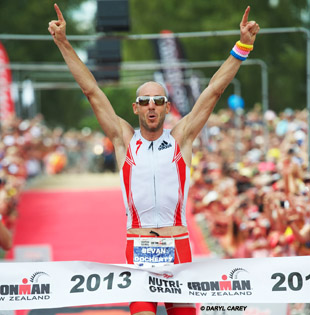
Bevan Docherty has one of the greatest resumes in the history of triathlon –2004 ITU World Championship gold and 2004 Olympic silver, 2008 ITU World Championship silver and 2008 Olympic bronze. In addition, he has scored a bushel of other great medal finishes – 2006 Commonwealth Games silver, 2007 Hy-Vee World Cup silver, 2007 Escape from Alcatraz runner-up and 2012 Ironman 70.3 World Championship bronze.
While he made his third New Zealand Olympic Triathlon team in 2012, his 12th place finish at London was a sign that his age – 34 – was catching up and his 28 minute flat 10k speed – which has powered the New Zealander to several of the greatest come-from-behind sprint victories – was slowly but surely decreasing. His win at Ironman 70.3 Panama and bronze at the Ironman 70.3 World Championship were further signs that his future was in long course.
Docherty passed his first Ironman test with flying colors, winning at Taupo in 8:15:35 and breaking Cameron Brown’s course record. Docherty spoke in a telephone interview from his home in Santa Cruz, California after his return from New Zealand.
Slowtwitch: Congratulations on your impressive win at Ironman New Zealand. What did this win in your Ironman debut mean to you?
Bevan Docherty: Essentially it meant I was able to win the biggest event in my home town of Taupo, which makes it an especially treasured day for me. It was also a sign that I can make it in long distance and therefore I have at least 5 more years in the sport of triathlon before I have to retire. It also meant I was able to shut up a few critics.
ST: In addition to beating one of the sport’s great Ironman competitors on the day, your 8:15:35 time also beat Cameron Brown’s course record – the best of his incredible 10 wins at this event. What did this tell you?
Bevan: I think I got very lucky because conditions were ideal. But it was definitely an honor to do it in front of Cam Brown.
ST: And what did it tell you about your eventual capabilities at Kona?
Bevan: Obviously Kona is my ultimate goal and I realize it’s going to take time before I can become a good enough athlete and learn enough about the distance to be competitive. This result reassures me that I have what it takes. But the main thing was for me to learn from the event. Unfortunately it went too well for me. I made a few mistakes but most of the race went according to plan. I feel I learn better from mistakes than success. I can take a little from this race but I still have a long way to go.
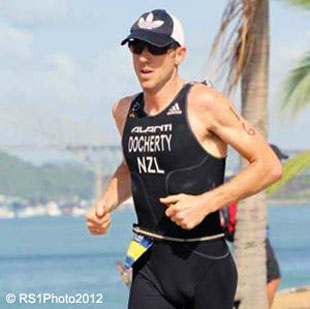
ST: What had you done to prepare yourself for the Ironman marathon?
Bevan: I hadn’t really prepared myself a hell of a lot specifically for this race. The training I’ve been doing over the years prepared me. As a short course athlete I had a long run every week. And I have always done solid 30-35 hour weeks regardless. My only change – I did a few 2:45 runs. That was about it. To be honest, the rest of the training was easier. I still firmly believe short course training takes more out of you with its high intensity. I’m quite happy with the workload done to get this result.
ST: How much better can you be at the marathon distance — in an Ironman?
Bevan: I got flak from people about this issue. But I truly believe that sub 2:40s are possible and I quite feel I can do it. For example, I ran just under 2:50 at Taupo. That included two toilet stops – one where I actually wiped my butt. I wasn't too sure what other athletes were doing, but I heard the next one was 10 minutes behind. So there was no pressure – and plenty time to wipe your butt. Also, I blew up when I stopped drinking Coke. Personally I think I was on sub-2:40 pace before I ran out of fuel near the end of lap 2 – about 16 miles.
ST: As you ran a fine 2:49 marathon at Taupo, how daunting a task does it seem to compete with the likes of Pete Jacobs (2:41 marathon at Kona) Craig Alexander (2:42 marathon at Kona and 2:39 at Melbourne) and Marino Vanhoenacker (2:39 at Ironman Austria)?
Bevan: Daunting? I know I am capable of running those times. I just have to figure a few things out. I truly believe I can do it. Just ask Crowie. I used to train with him in Boulder and he knows I can do it. It won’t be easy. There is a lot of hard work ahead of me – and I look forward to it.
ST: How much did the marathon hurt?
Bevan: Not many people are going to like this. But as much as I was expecting it to be painful, the marathon just seemed like another training day out there. To be honest I train pretty hard. Most people who train with me realize how hard I train. So my time of 2:49 was good enough on the day, but I believe I can do better. I made some silly mistakes with nutrition – I stopped drinking Coke because felt I was going to vomit. It turns out me and warm Coke don’t agree. In terms of the actual marathon, I felt it was not that difficult physically.
ST: Do you think you could better your sister Fiona’s best pure marathon time [2:32] in an Ironman?
Bevan: Am I faster in an Ironman marathon than my sister was at the pure marathon [2:32]? No way. I don’t think anyone can run an Ironman Marathon faster than that.
ST: Do you think your training is different from many Ironman athletes?
Bevan: I personally believe a lot of athletes over train. I think I went into that race a little underdone, but fresh. I am so new to this sport I know I have a lot to learn.
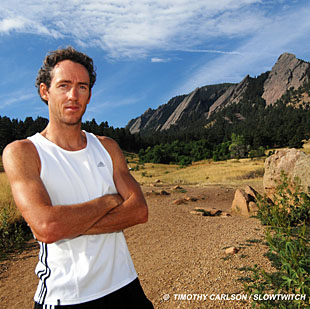
ST: Ironman is another sport?
Bevan: It is a different sport. To think that every swim, bike and run event is the same would be like comparing the 1500 meters to the marathon. They are both running, but there are so many different elements to it. Obviously nutrition is the biggest part of learning the Ironman and it is something I have yet to master. In terms of swim-bike-run, I think I am well-conditioned.
ST: How did warm Coke make you feel?
Bevan: I was feeling nauseous, like I was going to vomit. But then once I did bonk, I got more Coke in me and got back on track again. I hope in Hawaii they have cold Coke out there. That would be the greatest thing for me.
ST: How have you done in the heat?
Bevan: I have raced Olympic distance in some of the hottest places on the planet. I seem to do well but I still need to learn about diet and hydration. Taupo heat and Hawaii heat are very different. I’d even like to know if other guys go to toilet during the race. I have to figure out those kinds of issues and what works for me there. What works for me on the bike when I start moving from normal electrolytes to Coke — or should I stay on electrolytes? I realize there is a reason why it takes a couple of years to learn how to win in Hawaii.
ST: How much support did you experience from your home town Taupo crowd?
Bevan: A tremendous amount – it was awesome to have them cheer for me. I certainly had a distinct advantage that side of things, although a lot of people are big fans of Cameron and like to call him one of their own. It is magical to have the event in a small town like Taupo. Everyone gets behind it. Plus it was great to have my mum and dad, Ray and Irene, there to cheer for me.
ST: What did you and Marko Albert [who finished 2nd to Docherty] say to each other?
Bevan: Before and during the race we didn’t really have so much to say to each other. We know each other from the ITU side of the sport and I think we knew we would swim and ride together and would try to key off each other. I made it clear to Marko that I had no idea how to pace myself in the event. Thinking about it afterwards, I believe I would have gone out a helluva lot harder and that would have been a catastrophic explosion. It was great help to have an athlete of his caliber to key off. .
ST: What words did you exchange with Cameron?
Bevan: Not a lot. I think he had his game face on. Cam is a nice guy and we have lot of respect for each other, but we did not really talk in the race. Later, we had a chance to talk because we did some appearances for the Triathlon New Zealand Youth Development program.
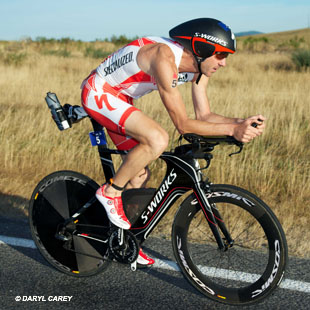
ST: To what degree did you moderate your pace on the bike so you wouldn’t wear yourself out for the run?
Bevan: I felt very comfortable riding with Marko and we were still putting time on the others. Then when I got to about ¾ of the way through the bike, I felt a little greedy – like I could push even harder and take it all the way in and put a significant amount of time on everyone else. At the start of the race, I wanted to come just a little ahead after the bike. I thought 5 minutes would be good. Then 6, then 7. [Docherty was 3:18 ahead of Albert, 11 minutes ahead of Cam Brown, and more ahead of the rest of the field at T2] I was nervous because I’ve seen so many guys go out and take a massive lead and then explode. I was very cautious and certainly held back by that caution.
ST: Will Ironman pace come naturally to you?
Bevan: I find it difficult to back off. Put it this way — I train around 2:40 to 2:45 marathon pace. Going out on the run I just went out on normal training pace. In those first miles, my 2:45 pace was not significantly faster than how I train.
ST: Did you go easier on the bike [Docherty rode a race-fastest 4:35:06 – 3:38 better than Marko Albert].
Bevan: It is certainly tough for me. You start to get nervous. Now I’ve done one Ironman, I know the pace I can go and can gauge myself off that. This time around, I wanted to feel like I was soft pedaling, and at times I was. At other times you go through tough points and have to work hard. I was apprehensive about hitting the wall.
ST: Who gave you the best advice about the Ironman?
Bevan: I don’t think anyone gave me great advice. I guess if somebody had told me not to worry about vomiting Coke and keep drinking I might not have bonked. Also, I learned that it is better to vomit up stuff you don’t want than to stop and hit the toilet.
ST: Did you have any surprises about pacing in Taupo?
Bevan: One good thing about my first Ironman race at Taupo was my naiveté about what I was walking into. Sometimes — maybe on the swim – I hadn’t worked that hard before. It was a bit of an advantage to be not too sure what I was getting myself into.
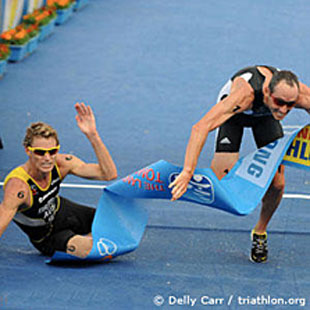
ST: What motivated you to switch to Ironman 70.3 and Ironman at the age of 34?
Bevan: When I kept getting my butt kicked in short course triathlons and I could see that winning an Olympic gold medal was beyond reach. To be honest, I’ve always wanted to do Ironman, but it happened last year when I was getting my ass handed to me.
ST: You still have enormous strength, endurance and speed?
Bevan: I still believe in my day I could hold my own with anybody. It was just age was against me. Ten years ago I could peak and hold that peak for an entire season. Whereas, a couple years ago could peak and hold it a couple months. Last year I was on for a week or two — and then that peak would disappear again. It was frustrating to get those peak moments just now and again. I concluded that this tired old body just could not stay at that level for long.
ST: Was it simply age?
Bevan: It was age or having family and commitment — who knows? At my peak I could stay on my toes to run 3 minutes per kilometer, all day.
ST: Did you consider the switch after the Beijing Olympics?
Bevan: After Beijing, or at least a couple years ago, I started to think maybe I could just move to long course. Unfortunately I was listening to too many other people. I should have just listened to myself rather than other people who kept telling me that I should go to the Olympics again. Most of those people have not been to the Olympics and wished it for themselves. They said I had an Olympic silver and a bronze and should get a gold. But a couple years ago it became clear time was against me.
ST: Were you at all influenced by slipping from your high standards to 12th at the 2012 Olympics and 14th at the 2012 Auckland WTS Grand Final?
Bevan: I had good effort at the London Olympics, but the course in London did not suit me at all. At Auckland, I felt crook at the end and was just kind of showing up for the race. The Auckland course, with all its hills, was made for me and I could have done a helluva lot better had it been my target race. In a way it was good because now Olympic distance racing is completely out of my system.
ST: Do you think you might have waited a bit too long to take a crack at Ironman – and Kona?
Bevan: Probably. I think I waited a couple of years too long. But when Macca and Crowie last won at Kona, they were 37 and 38. I’ve got time. I don’t think waiting until after the London Olympics is a huge issue, because I have conditioned well the last few years.
ST: How does your body feel after your first Ironman?
Bevan: It feels good to go. Subconsciously I want to hold back now because it’s a long year. I had a good start, and I feel will regain this momentum by October. But all my racing in between will be at the 70.3 distance.
ST: How much did you have left in the tank at the end at Taupo?
Bevan: Not a helluva lot. I really worked pretty hard and I got pretty tired after the race. But I think what hurt most after the race was my stomach. I’m not used to eating gels and sugar all race long. After that, I craved normal food.
ST: What sort of bike mileage did you put in to ready yourself for Taupo?
Bevan: Nothing special. I rode 15 to 18 hours a week. I think my longest ride was 180km. I needed a couple of those. But when I go for a 160k or 100 mile ride I do it significantly harder than most people, probably harder than I raced. It was a pleasant surprise that you can do it easy and still put time on others.
ST: Maybe it won’t go as well next time?
Bevan: Who knows? Maybe I had a really good day and it all felt easy. I am hoping that feeling does not change. I have to be aware of the quality of field at Kona. I am pretty sure it will be a different story. I have to do my homework. And like I say, I learn more from my mistakes than from my success.
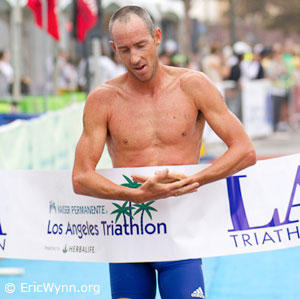
ST: Will you be doing another Ironman before Kona?
Bevan: Unfortunately I am not doing another Ironman until Kona. So I am going to have to learn from other people’s mistakes. I will have to go through the record and see what went wrong with other people and try not to make that mistake myself.
ST: Will you be going to Kona to train?
Bevan: I plan to go into Kona at some time this year and do a week’s worth of training. Before the race I will go in as late as possible. The main reason for that is going in late I do most of my training off road here because off road running is easier on the legs.
ST: Was your win at Panama 70.3 or your 3rd place at the Ironman 70.3 Worlds in Las Vegas helpful in adapting to long course?
Bevan: I don’t think those races were that important. I don’t think either one helped me with my transition to long course. They seemed more similar to Olympic distance racing than Ironman. Nothing helped more than my years of conditioning and hard training under my old coach Mark Elliott from 2002 to 20011. Since then I have then coached myself
ST: Why did you pick Santa Cruz to live and train?
Bevan: For several years, we lived in Boulder, Colorado and split time in New Zealand and the US. Now I am in Santa Cruz 90 percent of the time. I am a US resident and my wife Cheryl and stepson Scott and children McKenna and Fletcher are all US citizens, so to be honest I am very happy where I am now and happy being around my family. The training is great and the weather is great in California, and it shows in my racing and training.
ST: Why did you leave Boulder?
Bevan: I just can’t do Boulder winters and my 16-year-old stepson Scott needed to remain in one place for school. And I wanted to find a climate I could train all year round. And I wanted to live on the West Coast. So a couple years ago, we rented a car and set out north from San Diego and stopped in Santa Cruz. It is perfect. It has awesome off road running trails, a perfect climate just one hour from the San Francisco airport. It’s a nice, small community, close to San Jose and San Francisco. I can’t complain – except for the fog.
ST: What do you think of your Santa Cruz squad mate Dylan McNeice’s winning Ironman distance debut?
Bevan: That was impressive. It was great to see Dylan finally pull out a result competing with very good athletes. And Paul Matthews lives here full time as well. There are some big things to come from that boy, too.
ST: What is your ultimate goal in triathlon?
Bevan: I would like to be remembered as one of the most successful triathletes ever. That I didn’t get Olympic gold kinda sucks. I've won everything else – a world title, Olympic silver and bronze. I’d really like a Kona title too. If I were to win Ironman Hawaii that would certainly round out my career. .
ST: Looking back, could you have done better than 12th at the 2012 Olympics?
Bevan: The only way would have been to leave my family and go away for six months and start being the old selfish Bevan Docherty of years ago. I was not willing to make that sacrifice. That was probably the only way I might have had a better result. That is something I learned very quickly when I had kids. There is a lot more to life than Olympic medals and world titles. Family is far more special than that. Hopefully you can be great and have a world title and the family.
ST: What do your sponsors think about your going long course?
Bevan: Right now I only have two – Specialized and adidas – and they are super happy obviously. They are the only two who put their hands up and backed me. They have been fantastic and it was nice to give back to them and say look your backing me won’t be wasted. You guys have been great and I am here to represent! Going to long course triathlon, having Specialized as a bike sponsor is crucial. They are nearby where I can build all of these bikes and test them. They are in Morgan Hill, just a 40-minute drive from where I live. I think that it’s huge advantage as we’ll certainly work closely with them. We can work out where to put gels and Power Bars, where to put fluids – all that stuff.
ST: So are you on course?
Bevan: I am extremely glad this year have a sponsor like Specialized and live in a place like Santa Cruz – everything is on track. I’ll just try to control the controllable and cross my fingers for the uncontrollable.


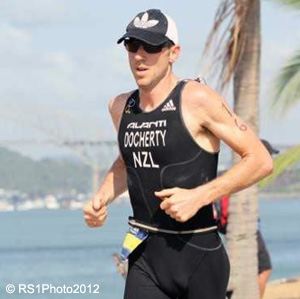
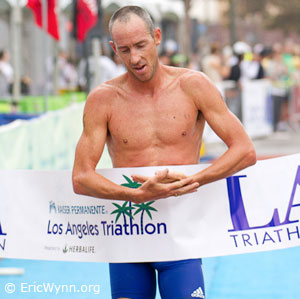
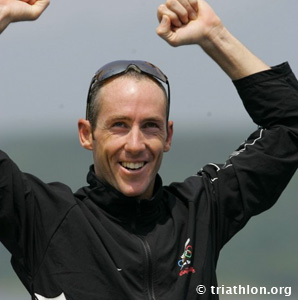
Start the discussion at slowtwitch.northend.network